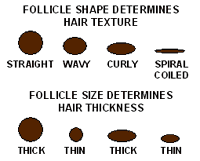What is it about black hair that makes it so different from other hair types? It goes far deeper than just a cultural difference. The biology of black hair is outstandingly similar to other hair types. But, it is the morphological difference in the hair’s elasticity and coils that causes it to have unique needs. Compared to silkier hair African-American hair contains more lipids, or fats, but the lipids are less bonded which is why the hair loves oils so much. Along with that, the follicle size is much thicker and it has a flattened elliptical cross section causing it to be curlier than other hair types. 
Obviously black hair has more kinks and curls, which causes it to be weaker than other hair types and that gives it greater opportunity for breakage. Common styling tools such as brushed and combs forces the curl to straighten out, but the hair has a natural resistance to straightening and that is what leads to the breakage. So, black people in general need to be gentle when it comes to taking care of their hair. Also, the curls cause it to have a lower moisture content. Ironically though, it is the most hydrophilic kind of hair meaning that it is water-loving. Regardless of your hair texture or curl pattern water is essential to keeping the hair healthy, and is an excellent source of moisture. But, the primary source of moisture is something called sebum. The scalp of every hair type produces this as a way to moisturize and protect the hair follicle. Water and sebum move up and down the shaft of the hair providing the follicle with moisture. It is when sebum and water can not travel up and down the shaft is what leads to dry hair, and this is exactly what happens to black hair. The tight curl pattern prevents the travel, compared to straighter hair types where it can flow freely. So, it is crucial that black hair maintains the little moisture that the hair does receive. This is why black hair does not benefit from daily hair wash, or often hair washing in general. That process can be very drying to the hair and cause damage. A shampoo with a ph of 6.5 can really benefit the hair because it reduces sebum loss and seals in the water within the follicle.
Black hair is extremely prone to damage because of the shape of the follicle and there is no way to straighten the hair without minor damage to the hair. African-Americans many times find themselves using extreme amounts of heat protectant to maintain their curl pattern, and often that may not even work. Heat damage, when the curl pattern is lost due to extensive heat placed on it, is rather common among black women and is something that I have experienced as well. The most effective method is simply to clear away from all heat products. All the hair styles I have discussed are called protective hair styles because they really do protect the hair shaft, and promote healthy hair growth. I find it important that all people with black hair take the time to learn their hair type and how to keep it healthy because there is a lot more to it than you would think.
Works Cited:
Hudson, Kimika. “The Missing Education on Black Hair.” The Huffington Post. TheHuffingtonPost.com, n.d. Web. 22 July 2016.
“Point of Interest!” : Chemistry of Your Hair: African Hair Types. N.p., n.d. Web. 22 July 2016.
I don’t know how to edit a comment, but I meant that, “I’ve never put much thought into my hair,” not “I’ve never put much thought to my hair.”
Good conclusion Tia! I had no idea that biology and chemistry played such a large role in how hair bends and breaks. Your blog has been really interesting — I’ve never put much thought to my own hair, let alone that of other cultures. Thank you for sharing your story, and I hope that you can continue to inform me over the next few years.